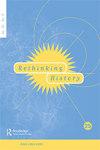数字视觉史:使用数字技术的历史策展
IF 0.8
2区 历史学
Q1 HISTORY
引用次数: 1
摘要
数字技术正在彻底改变我们学习和理解历史的方式。历史资料和物证越来越多地被转化为数字对象,并整合到更大的数据库中,为数字时代的历史研究提供了新的途径。本文回顾了处理新形式史学的主流实践。它通过提供数字策展实践来实现这一目标,并概述了数字视觉历史的新方法论概念。为此,本文探讨了历史视觉来源的一个特别具有挑战性的测试案例,它不仅对集体历史想象产生了持久的影响,而且越来越多地转向数字化:大屠杀的艰难视觉遗产。本文以欧盟地平线2020项目“大屠杀的视觉历史:数字时代的反思策展”(VHH)(2019-2023)框架下开发的数字基础设施为例,突出了这些视觉来源的重要方面,该项目旨在(重新)将盟军暴行记录作为关系和迁移图像进行背景化。在此过程中,本文展示了如何通过策展的史学实践和数字技术的结合,揭示过去事件的视觉遗产是动态的和相互关联的。本文章由计算机程序翻译,如有差异,请以英文原文为准。
Digital visual history: historiographic curation using digital technologies
ABSTRACT Digital technologies are revolutionizing the way we study and understand history. Historical sources and material evidence are increasingly being transformed into digital objects and integrated into larger databases, offering new ways of researching history in the digital age. This article reviews dominant practices that deal with new forms of historiography. It does so by offering digital curatorial practices and outlines a new methodological concept of digital visual history. For that purpose, the article explores a particularly challenging test case of historical visual sources, which not only had a lasting effect on the collective historical imagination but has also increasingly turned digital: the difficult visual heritage of the Holocaust. Highlighting significant aspects of the afterlife of these visual sources, the article uses as an example the digital infrastructure developed in the framework of the EU Horizon 2020 project ‘Visual History of the Holocaust: Rethinking Curation in the Digital Age’ (VHH) (2019–2023) that aims at (re)contextualizing Allied atrocity records as relational and migrating images. In doing so, the article demonstrates how, through the combination of historiographic practices of curation and digital technologies, the visual heritage of past events is revealed as dynamic and interconnected.
求助全文
通过发布文献求助,成功后即可免费获取论文全文。
去求助
来源期刊

Rethinking History
Multiple-
CiteScore
1.20
自引率
0.00%
发文量
26
期刊介绍:
This acclaimed journal allows historians in a broad range of specialities to experiment with new ways of presenting and interpreting history. Rethinking History challenges the accepted ways of doing history and rethinks the traditional paradigms, providing a unique forum in which practitioners and theorists can debate and expand the boundaries of the discipline.
 求助内容:
求助内容: 应助结果提醒方式:
应助结果提醒方式:


